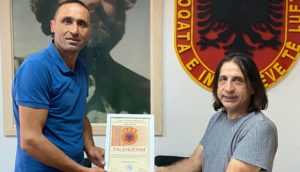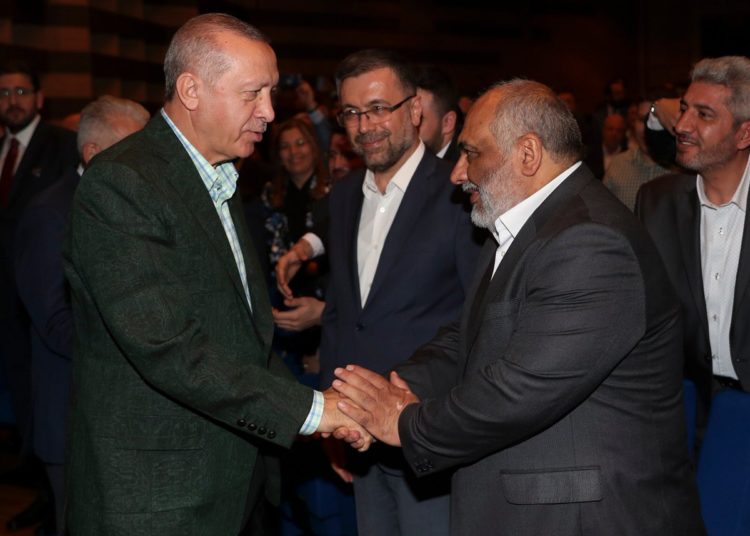Abdullah Bozkurt/Stockholm
The Kosovo Liberation Army (KLA), a separatist group that fought during the 1998-1999 war against Serbia, had links to a Turkish jihadist charity group that helped both al-Qaeda and the Islamic State in Iraq and Syria (ISIS) in later years.
According to photographs obtained by Nordic Monitor, the KLA, locally known as Ushtria Çlirimtare e Kosovës, or UÇK, acknowledged the help of the Foundation for Human Rights and Freedoms and Humanitarian Relief (İnsan Hak ve Hürriyetleri ve İnsani Yardım Vakfı, or IHH) in a citation awarded to the Turkish group for its help in the late ’90s.
One photograph showed Osman Atalay, a member of the IHH board of trustees, accepting a citation from Xhevdet Qeriqi (known as Cevdet Çeriçi in Turkish), president of the Association for KLA War Veterans, who thanked the IHH official for the group’s assistance during the war.
The citation was dated July 20, 2021 and was presented to Atalay by the association’s president Qeriqi in August. The photos and certificate confirmed the long-known connection between Turkish jihadists and the KLA, an ethnic Albanian group that now faces charges of war crimes. Some senior KLA commanders were charged or investigated for alleged war crimes by the Kosovo Specialist Chambers and Specialist Prosecutor’s Office, based in The Hague.

Many IHH officials were also indicted and/or investigated in Turkey for their links to terrorist groups including al-Qaeda. According to intelligence documents submitted to the UN Security Council on Feb. 10, 2016, Russian Ambassador Vitaly Churkin, the then-permanent representative to the UN, revealed Russian intelligence documents that even furnished the license plate numbers of trucks dispatched to Syria by the IHH loaded with arms and supplies bound for jihadist groups including the Nusra Front.
The network of this highly controversial charity was also accused of smuggling arms to al-Qaeda-affiliated jihadists in Syria in January 2014 in a criminal investigation conducted by a prosecutor in Turkey’s eastern province of Van.
The investigation led to the IHH when wiretaps and surveillance revealed that the Kayseri and Kilis branches of the IHH were sending funds and medical and household supplies to jihadists in Syria with the help of Turkey’s National Intelligence Organization (MİT), which is run by Turkish President Erdoğan’s close confidant Hakan Fidan, an Islamist figure.
The prosecutor’s conclusion was that the NGO took part in the scheme knowing full well what it was involved in. It was not a random or individual participation but rather a deliberate scheme with the knowledge of IHH management.
Fearing that the expansion of the probe could lead to senior figures in the IHH and expose the links to his government, then-prime minister and now President Recep Tayyip Erdoğan quickly moved to quash it. The government dismissed and later arrested all police chiefs and prosecutors who uncovered the IHH’s clandestine dealings with jihadist groups.
Citation acknowledging the IHH’s efforts in the 1990s to help the KLA in its armed campaign:
According to the testimony of a Turkish woman named Merve Dündar, the wife of ISIS militant Mahmut Gazi Dündar, both of whom were listed as suspected ISIS suicide bombers and placed on a watchlist, the IHH channelled logistical supplies to people who live in ISIS-controlled cities and towns. “We were living in ISIS territory, and my husband wasn’t working in Syria. We were distributing [IHH-provided] supplies to the needy,” she told the court in a hearing on June 10, 2021.
Atalay, who leads the IHH network in Kosovo today, was red-flagged by Turkish investigators in 2013 when he was identified as collaborating with Iran’s Islamic Revolutionary Guard Corps (IRGC) Quds Force. The terrorism investigation into Quds Force cells in Turkey showed that Atalay was in frequent contact with Iranian assets.
The IRGC Quds Force case in Turkey never went to trial because the Erdoğan government squelched it in February 2014 after learning about the probe, which clearly incriminated senior government officials.
Many Turkish jihadists went to Bosnia and Kosovo during the conflict in the 1990s, and some of them lost their lives, while others returned, only to seek a new jihadist cause in their homeland or other conflict areas in Afghanistan and Pakistan and later in Syria.
In September 2021 the Kosovo Specialist Chambers and Specialist Prosecutor’s Office tribunal in The Hague launched hearings on war crimes allegedly committed by KLA commanders in the ’90s conflict. Salih Mustafa, a former KLA commander who appeared as one of the suspects in the first hearing, denied the charges. The tribunal indicted eight suspects including former Kosovo President Hashim Thaci, who resigned in 2020 to face charges of war crimes and crimes against humanity.
More than 10,000 people died during the 1998-99 war in Kosovo, which was halted when NATO intervened. In 2008 Kosovo declared its independence from Serbia, which was recognized by many countries including Turkey. Serbia, Russia and China did not recognize the move.
The IHH is still active in Kosovo and enjoys the Erdoğan government’s backing in its work abroad, especially that of intelligence agency MIT.












